#discipline and punish
Text
My Man Foucault

I love Noam Chomsky but if it's gonna be Chomsky vs Foucault, it's always my fav gay boi
Even though he rejected labels such as homosexuality bcs they result in negative consequences for those on whom these labels are attached.
But the fact that he said all this like what more than 40 years ago and yet its' so relevant today is both harrowingly scary and ironically beautiful at the same time.
#michel foucault#noam chomsky#politics#power#knowledge#power/knowledge#history of sexuality#discipline and punish#order of things#foucault#postmodernism#social reality#the illusions of reality#what 'seems' to be#resistance#micro-power#philosophy#I like to think Foucault was a Tumblr girlie#what do you think..... put your opinions in the comments
32 notes
·
View notes
Text

18 notes
·
View notes
Photo

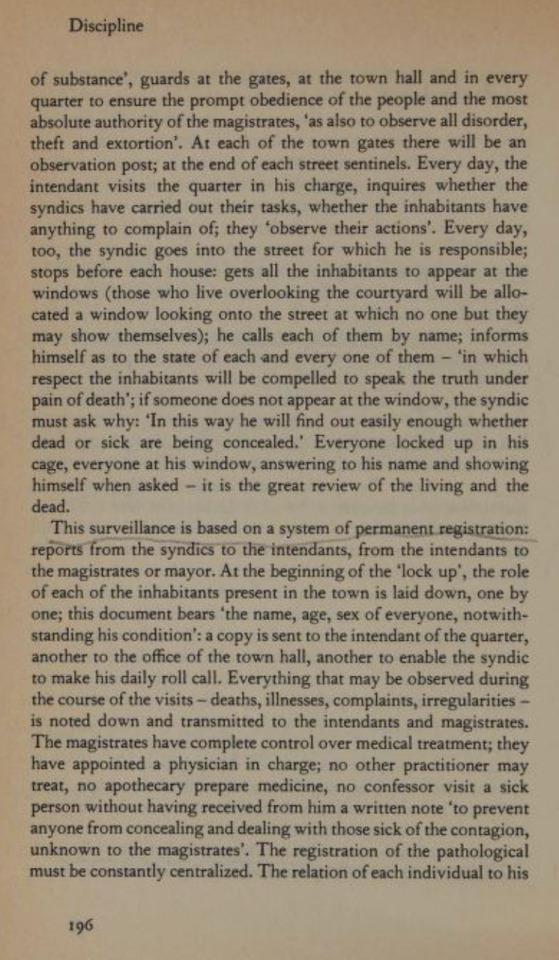
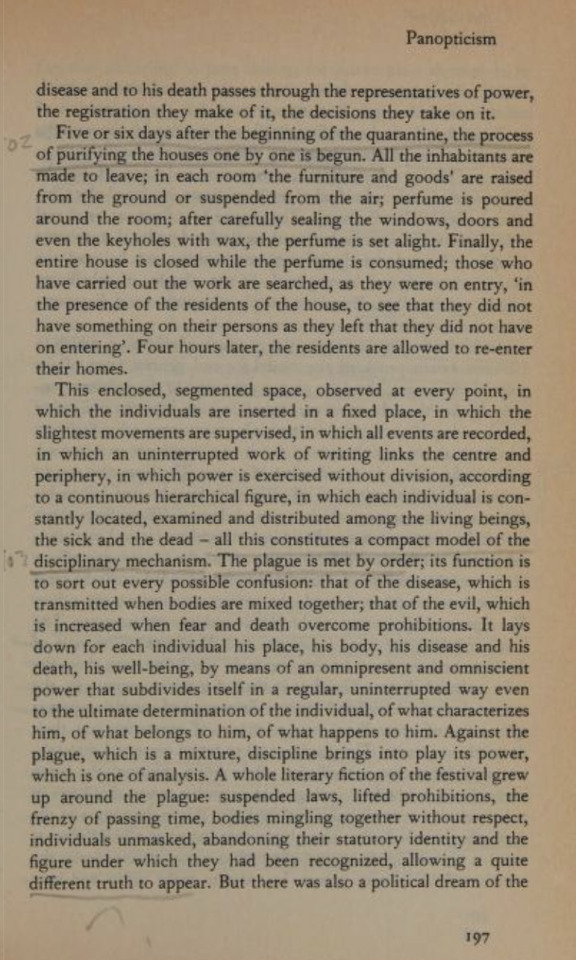
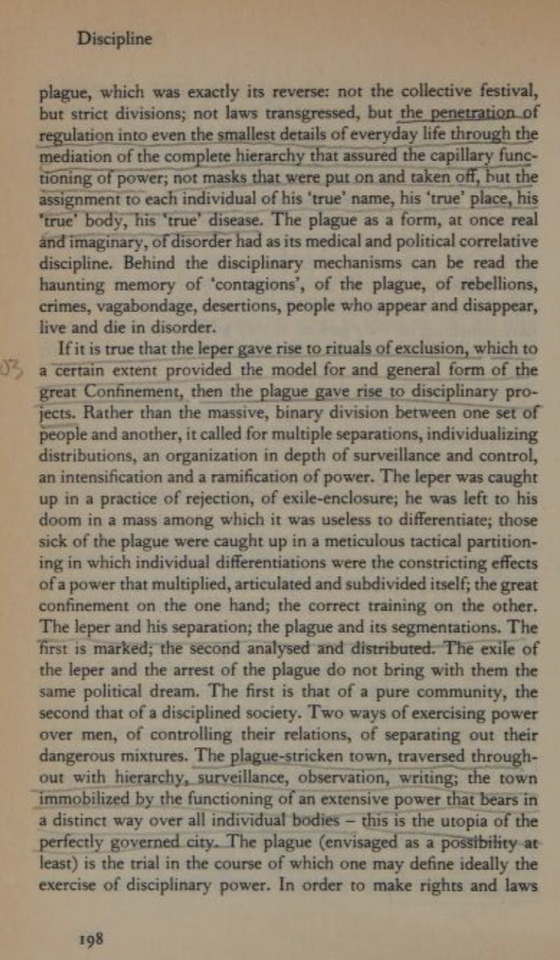
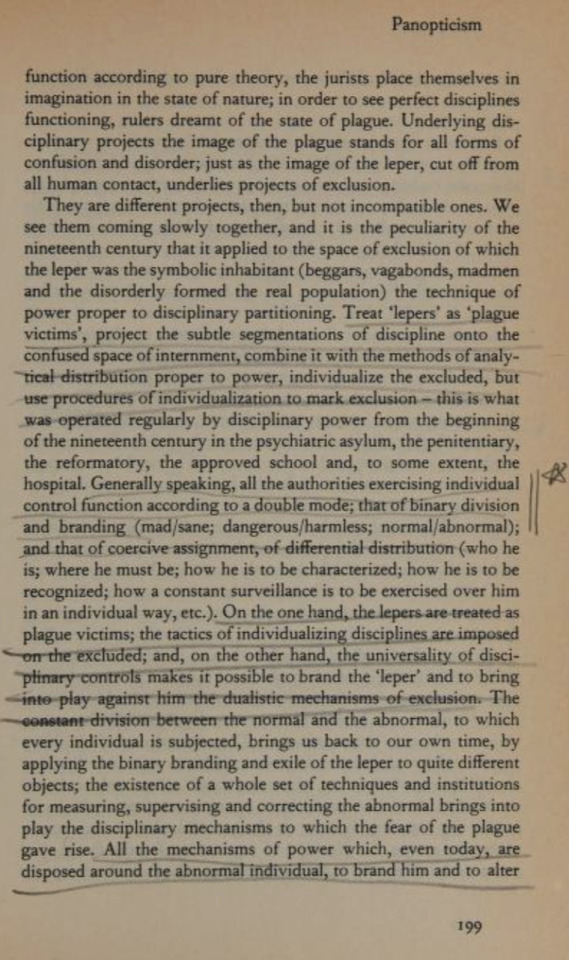
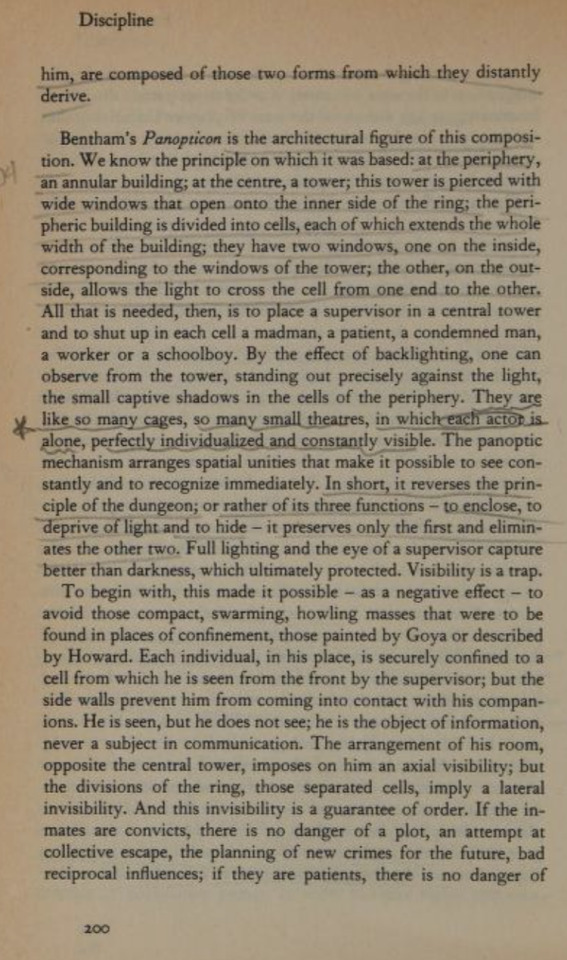



Michel Foucault, Discipline and Punish: The Birth of Prison
#michel foucault#mass incarceration#prison#space#structural violence#architecture#theory#literature#text#discipline and punish
48 notes
·
View notes
Text

The first group of asylum seekers boarding the Bibby Stockholm barge in Dorset, UK. Photo: Dan Kitwood/Getty.
13 notes
·
View notes
Text
With this new economy of power, the carceral system, which is its basic instrument, permitted the emergence of a new form of ‘law’: a mixture of legality and nature, prescription and constitution, the norm. This had a whole series of effects: the internal dislocation of the judicial power or at least of its functioning; an increasing difficulty in judging, as if one were ashamed to pass sentence; a furious desire on the part of the judges to judge, assess, diagnose, recognize the normal and abnormal and claim the honour of curing or rehabilitating. In view of this, it is useless to believe in the good or bad consciences of judges, or even of their unconscious. Their immense ‘appetite for medicine’ which is constantly manifested – from their appeal to psychiatric experts, to their attention to the chatter of criminology – expresses the major fact that the power they exercise has been ‘denatured’; that it is at a certain level governed by laws; that at another, more fundamental level it functions as a normative power; it is the economy of power that they exercise, and not that of their scruples or their humanism, that makes them pass ‘therapeutic’ sentences and recommend ‘rehabilitating’ periods of imprisonment. But, conversely, if the judges accept ever more reluctantly to condemn for the sake of condemning, the activity of judging has increased precisely to the extent that the normalizing power has spread. Borne along by the omnipresence of the mechanisms of discipline, basing itself on all the carceral apparatuses, it has become one of the major functions of our society. The judges of normality are present everywhere. We are in the society of the teacher-judge, the doctor-judge, the educator-judge, the ‘social worker’-judge; it is on them that the universal reign of the normative is based; and each individual, wherever he may find himself, subjects to it his body, his gestures, his behaviour, his aptitudes, his achievements. The carceral network, in its compact or disseminated forms, with its systems of insertion, distribution, surveillance, observation, has been the greatest support, in modern society, of the normalizing power.
Discipline and Punish, Michel Foucault
12 notes
·
View notes
Text
Queer books, day 25/30

Yesterday (6/25) was the thirty-ninth anniversary of the death of Michel Foucault, and so somewhat non-traditionally I want to look at a book by a queer person that is definitely not about LGBTQ+ people doing things, but is the basis of a lot of queer theory (and other theories--we'll get into it). Hey, it's my series, I get to make the rules.
My love for Foucault has been well-documented elsewhere. This morning, I saw someone write that many people find Foucault very difficult to read, but in reality one of the things I love about him is that he writes very clearly, especially for a philosopher, and his work is often full of very interesting ideas.
Foucault is interested in power and tracing the historical origins of the organizations/entities that exercise this power in our lives, like prisons, schools, workplaces, religious institutions, and the medical establishment. Discipline and Punish is largely about prisons (as well the subtitle might indicate), but he also talks about schools, factories, and the military in it. Basically, the story goes, in the late eighteenth/early nineteenth century, Jeremy Bentham designed a new type of prison that was supposed to induce not just punishment but REFORM in the people who were sent there. Picture a round building, where each inmate gets a room to themselves around the circle, and in the center a guard tower. Each cell has a window facing the tower such that the inmate can be observed by the guards, but not see the guards doing the observing. Thus the inmate is forced to assume that they are always under observation and ACT like they are always being observed (i.e., they must behave "properly"). Eventually, they learn to self police, and then they are reformed. This is the panopticon prison.
This type of structure is repeated in society in a lot of ways, it turns out. The way that schools teach students to internalize rules related to behavoir/comportment, to do assignments by certain arbitrary deadlines and to be responsible for these themselves, to study the material on their own because they won't know when they might be quizzed. Workplaces want you to learn how to spend your time as your boss directs even when your boss isn't there to keep an eye on you. Police surveilance among the non-imprisoned population works this way. Drones work this way. And on and on.
I heard someone on a podcast (I think it was episode 156 of Random Number Generator Horror Podcast Number 9) say that when we say "all cops are bastards," one of the things we have to do is learn to get rid of the cop in our heads. Well, this is an account of how that cop gets there.
There's a lot more to say about Foucault's body of work, which was extensive despite the fact that he was only 57 when he died. (I know that doesn't sound super young, but Kant died at age 79 and Bertrand Motherfucking Russell died at 97!). After all, this field of inquiry was extremely influential on feminists and queer theorists like Judith Butler. But instead, I'm just going to give you a couple of key quotes:
Police surveilance provides the prison with offenders, which the prison transforms into delinquents, the targets and auxiliaries of police supervisions, which regularly send back a certain number of them to prison.
(Does that critique sound familiar?)
[In the eighteenth century, what] was then being formed was a policy of coercions that act upon the body, a calculated manipulation of its elements, its gestures, its behavior. The human body was entering a machinery of power that explores it, breaks it down and rearranges it. A 'political anatomy', which was also a 'mechanics of power', was being born; it defined how one may have a hold over others' bodies, not only so that they may do what one wishes, but so that they may operate as one wishes, with the techniques, the speed and the efficiency that one determines. Thus discipline produces subjected and practised bodies, 'docile' bodies.
Anyway, Foucault's ideas are like a toolbox, and you can choose to apply them in different places. And that's the basis of A LOT MORE of modern discourse than I think we ever really talk about. So if you're at all interested in this stuff, I highly recommend it. 10/10, go and read.
#michel foucault#my beloved#discipline and punish#theory#queer theory#docile bodies#the panopticon inside your head#pride#thirty days of books#queer books
3 notes
·
View notes
Text
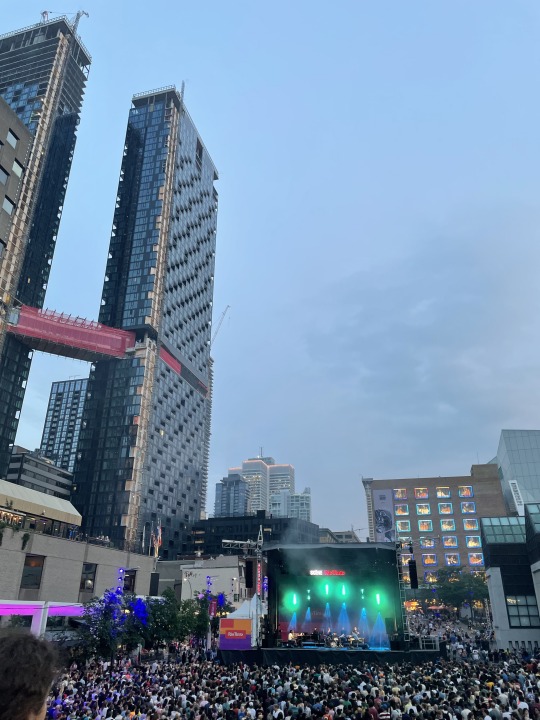
My daughter Christina has been scolded and I’m grounding her for a full week. Let the help deal with her.
Mommie has a jazz fest to enjoy and I’ll check in on Christina next Monday, although I doubt grounding that child will do any good. She’s such a homebody that she’ll probably just enjoy it, just like she always seems to enjoy being disciplined.
0 notes
Text
Consequently, one must use a temporal modulation. The penalty transforms, modifies, establishes signs, arranges obstacles. What use would it be if it had to be permanent? A penalty that had no end would be contradictory: all the constraints that it imposes on the convict and of which, having become virtuous once more, he would never be able to take advantage, would be little better than torture; and the effort made to reform him would be so much trouble and expense lost by society. If incorrigible there be, one must be determined to eliminate them. But, for all the others, punishment can function only if it comes to an end.
Michel Foucault, Discipline and Punish
#sex offender registry#prison abolition#capital punishment#prison#michel foucault#discipline and punish#foucault#the birth of the prison#discipline and punish the birth of the prison#1977#foucault 1977
0 notes
Photo

“Provisions For Flogging Convicts,” Kingston Whig-Standard. December 30, 1932. Page 1.
----
New Regulations Announced by the Minister of Justice
----
OTTAWA, Dec. 30 — New regulations in regard to the punishment of penitentiary convicts will provide that In any ease where the warden considers that corporal punishment should be inflicted that the evidence be taken on oath and, if the convict be found guilty, the warden shall award such punishment as he deems proper, but shall transmit the evidence to the superintendent for confirmation or otherwise before any punishment is imposed. If the sentence is confirmed by the superintendent, the warden shall proceed to have it Imposed. Convicts may be punished for offences by:
Forfeiture of tobacco and smoking privileges
Forfeiture of library privileges
Forfeiture of visiting privileges
Forfeiture of letter writing privilege
Forfeiture of remission of sentence
Hard bed with blanket not to exceed one month
Diet of bread and water not to exceed twenty-one consecutive
Confinement to an isolated cells with such diet as may be ordered by the surgeon not to exceed thirty days.
Flogging or strapping may be imposed as punishment when a convict is guilty of:
Personal violent to fellow convicts
Gross insolence or abusive language to any officer
Willfully breaking or destroying penitentiary property
When under-going punishment willfully making a disturbance In tending to Interrupt good order
Escaping or trying to escape
Acts of grow misconduct and insubordination
Some physical violence to any officer
Revolt insurrection and mutiny
Convicts who are found guilty of the above mentioned offences may be flogged or strapped upon the order of the superintendent.
#prison regulations#prison discipline#discipline and punish#corporal punishment#lashing#sentenced to be lashed#prison riots#prisoner resistance#convict revolt#1932 kp riot#penal reform#superintendent of penitentiaries#great depression in canada#crime and punishment in canada#history of crime and punishment in canada
0 notes
Text


It runs in the family

#an art#super danganronpa 2#sdr2#fuyuhiko kuzuryu#peko pekoyama#Fuyupeko#Kuzupeko#Thinking about them and their terrible childhood today. Kind of terrible lives in general huh#Neither of them could help each other when things got dicey in the household#Peko because the Kuzuryūs are NOT afraid to 'discipline' her. Fuyuhiko because it literally only makes things worse.#Both of them because if they show off how close they are the agents might rethink keeping Peko around. So they grit their teeth and bear it#I somewhat hc that the parents also aren't above involving the other in a punishment. Like.#Fuyuhiko can take a beating but he hates seeing Peko be hurt. Same for her. So if they REALLY wanna beat a lesson into one of them.... ykno#BUT THATS SAD. SO I ADDED THE NICE PICTURE AFTERWARDS#Child abuse cw#Cw child abuse
1K notes
·
View notes
Text
The carceral network does not cast the unassimilable into a confused hell; there is no outside. It takes back with one hand what it seems to exclude with the other. It saves everything, including what it punishes. It is unwilling to waste even what it has decided to disqualify. In this panoptic society of which incarceration is the omnipresent armature, the delinquent is not outside the law; he is, from the very outset, in the law, at the very heart of the law, or at least in the midst of those mechanisms that transfer the individual imperceptibly from discipline to the law, from deviation to offence. Although it is true that prison punishes delinquency, delinquency is for the most part produced in and by an incarceration which, ultimately, prison perpetuates in its turn. The prison is merely the natural consequence, no more than a higher degree, of that hierarchy laid down step by step. The delinquent is an institutional product. It is no use being surprised, therefore, that in a considerable proportion of cases the biography of convicts passes through all these mechanisms and establishments, whose purpose, it is widely believed, is to lead away from prison. That one should find in them what one might call the index of an irrepressibly delinquent ‘character’: the prisoner condemned to hard labour was meticulously produced by a childhood spent in a reformatory, according to the lines of force of the generalized carceral system. Conversely, the lyricism of marginality may find inspiration in the image of the ‘outlaw’, the great social nomad, who prowls on the confines of a docile, frightened order. But it is not on the fringes of society and through successive exiles that criminality is born, but by means of ever more closely placed insertions, under ever more insistent surveillance, by an accumulation of disciplinary coercion. In short, the carceral archipelago assures, in the depths of the social body, the formation of delinquency on the basis of subtle illegalities, the overlapping of the latter by the former and the establishment of a specified criminality.
Discipline and Punish, Michel Foucault
4 notes
·
View notes
Text
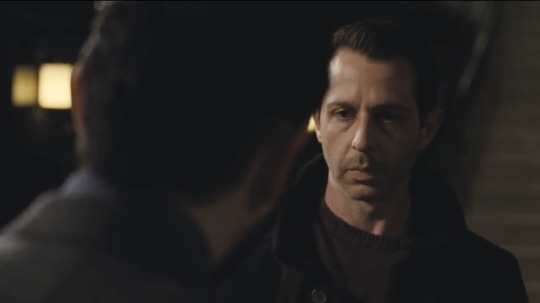
i hate this fucking show why does it looks like he’s being yelled at. he looks like he’s being yelled at when actually his best friend is begging him to talk to him. mr kendall roy. its both the shame of the grip logan has on him right now the shame of the humiliation logan is putting him through right now and also the. its the love. the love is violence. mr kendall roy thinks the love is violence!!
#kendall just wept into his father’s welcoming shielding embrace for the first time in either who knows how long or ever#and it was only after he’d just killed a kid#and now his best friend is putting thirty years of love and trust on the table and he thinks this love is violent toooooo#and no no i need you to understand its not that he’s afraid of stewy or thinks stewy is being manipulative#its like. the love is there because he did something wrong. you’re showing me love because i did something awful.#you putting love on the table feels like a punishment like discipline#am i making sense!!!!#kendall roy#kenstewy#m
552 notes
·
View notes
Text
"For most of the nation's history, the prohibition on torture in American law and tradition largely rested on the premise that the civilized sensibilities of Americans, especially the capacity and even obligation for empathy for fellow citizens, would make torture unthinkable. But the nation's boundaries and polyglot population grew faster than did Americans' capacity to sympathize with all those with whom they share the continent. The extension of rights also lagged, creating disparities in the protections that law and tradition afforded those who had been deemed undeserving, unwelcome, and powerless. And during war, of course, military exigencies and the primal urge for retaliation attenuated Americans' capacity for sympathy. Thus, those who were least likely to enjoy the shield of their neighbors' compassion or were deemed least deserving to be Americans were the most vulnerable to torture."
W. Fitzhugh Brundage from Civilizing Torture: An American Tradition
#quotes#w. fitzhugh brundage#civilizing torture#civilizing torture an american tradition#preservation#gross amount of material#discipline and punish#justified#heterotopia#compassion#how rights went wrong#do labels inhibit?#speculations#instinct#behave#an anatomy of pain
0 notes